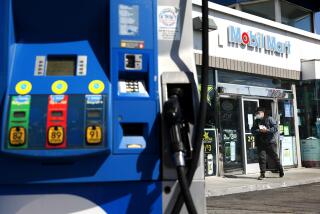U.S. Says BP Drove Up Price of Propane
WASHINGTON — Federal investigators said Wednesday that traders at oil and gas producer BP cornered the U.S. propane market in the winter of 2004 to illegally manipulate prices, driving heating costs higher for rural consumers.
The Commodity Futures Trading Commission said BP traders, with the consent of senior management, “purchased enormous quantities of propane to establish a dominant” position in the market and then withheld fuel from the market to drive prices higher.
Details of the alleged scheme, compiled with help from internal company documents and recorded conversations, were outlined in a civil lawsuit filed against the British company’s BP Products North America Inc. unit.
“It’s pretty clear as to what they were doing,” commission attorney Paul Hayeck said.
The suit was filed in U.S. District Court for the Northern District of Illinois.
Also Wednesday, the Justice Department announced that one former BP trader implicated in the scheme, 34-year-old Dennis N. Abbott of Houston, has pleaded guilty “to conspiring to manipulate and corner the propane market.”
The agency said Abbott, who has agreed to cooperate with law enforcement in a continuing investigation, faced as many as five years in prison and a fine of $250,000.
BP spokesman Ronnie Chappell said that “market manipulation did not occur” and that the company intended to fight the charges in court. Chappell, however, said that an internal investigation conducted by BP found that several employees failed “to adhere to BP policies governing trading activities” and that they were dismissed from the company.
“We have also taken steps to strengthen the supervision of our trading activities,” Chappell said.
According to the lawsuit, the plan to manipulate prices and pump up profit began to take shape in early 2004 amid declining propane prices that were particularly painful to BP because its traders had made significant bets that prices would rise.
The commission paints trading manager Mark Radley as a key architect of the plan to turn the situation around and potentially net the company $20 million in profit. In one recorded conversation, Radley boasted that the propane market was “vulnerable to a squeeze.” In another, he said the market was “tight enough that if someone wanted to play games with it, potentially they could.”
BP shares rose $1.01 to $67.97.
More to Read
Inside the business of entertainment
The Wide Shot brings you news, analysis and insights on everything from streaming wars to production — and what it all means for the future.
You may occasionally receive promotional content from the Los Angeles Times.










